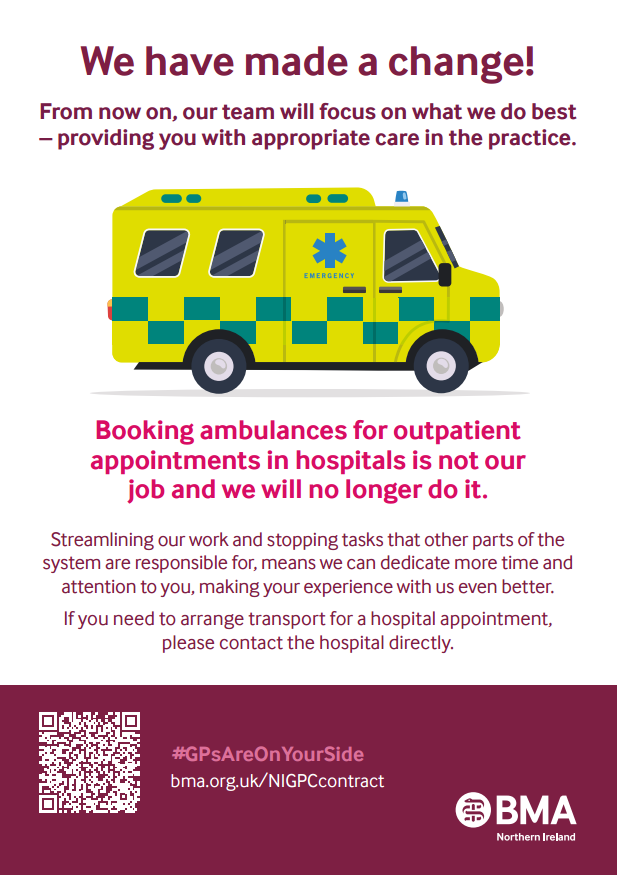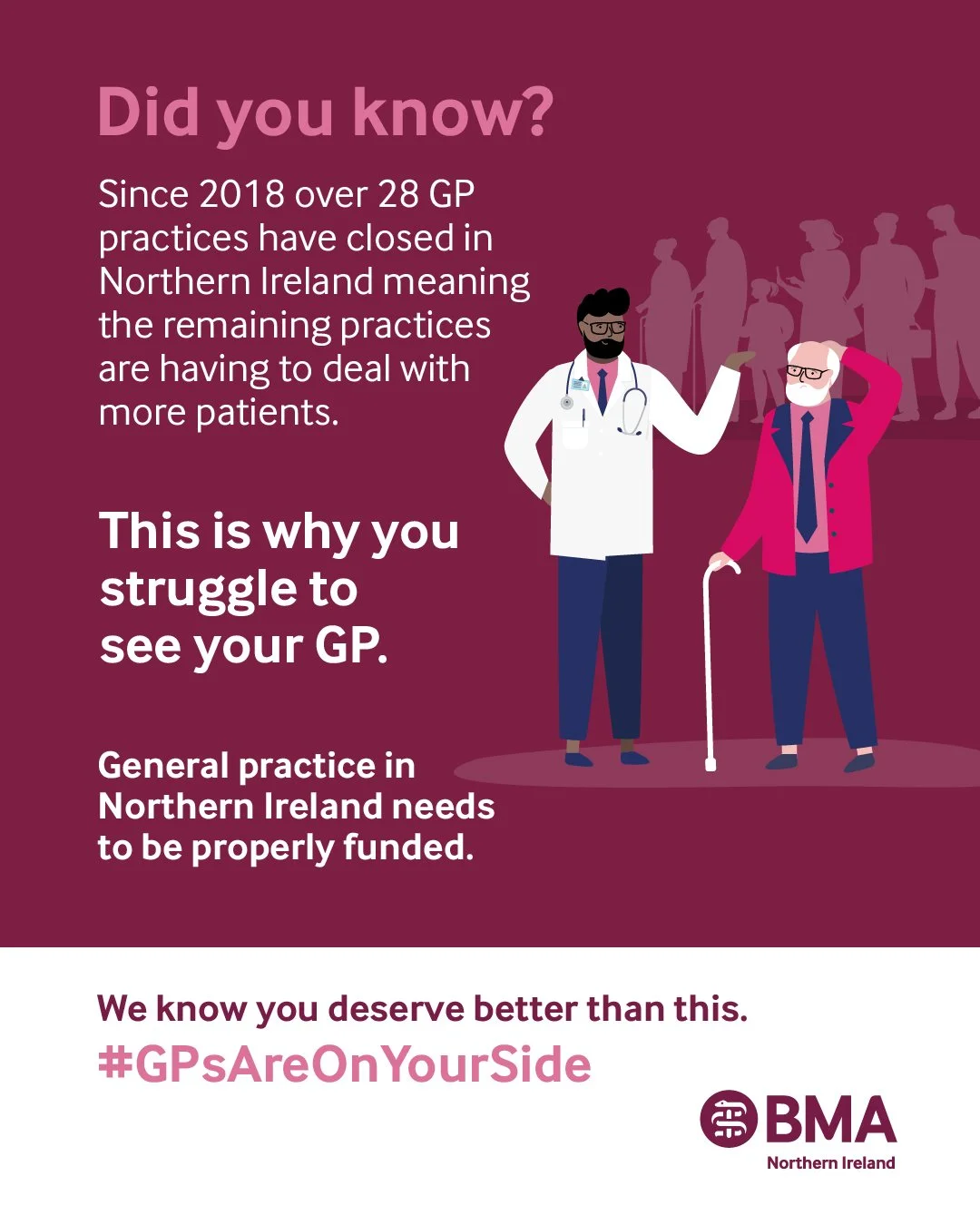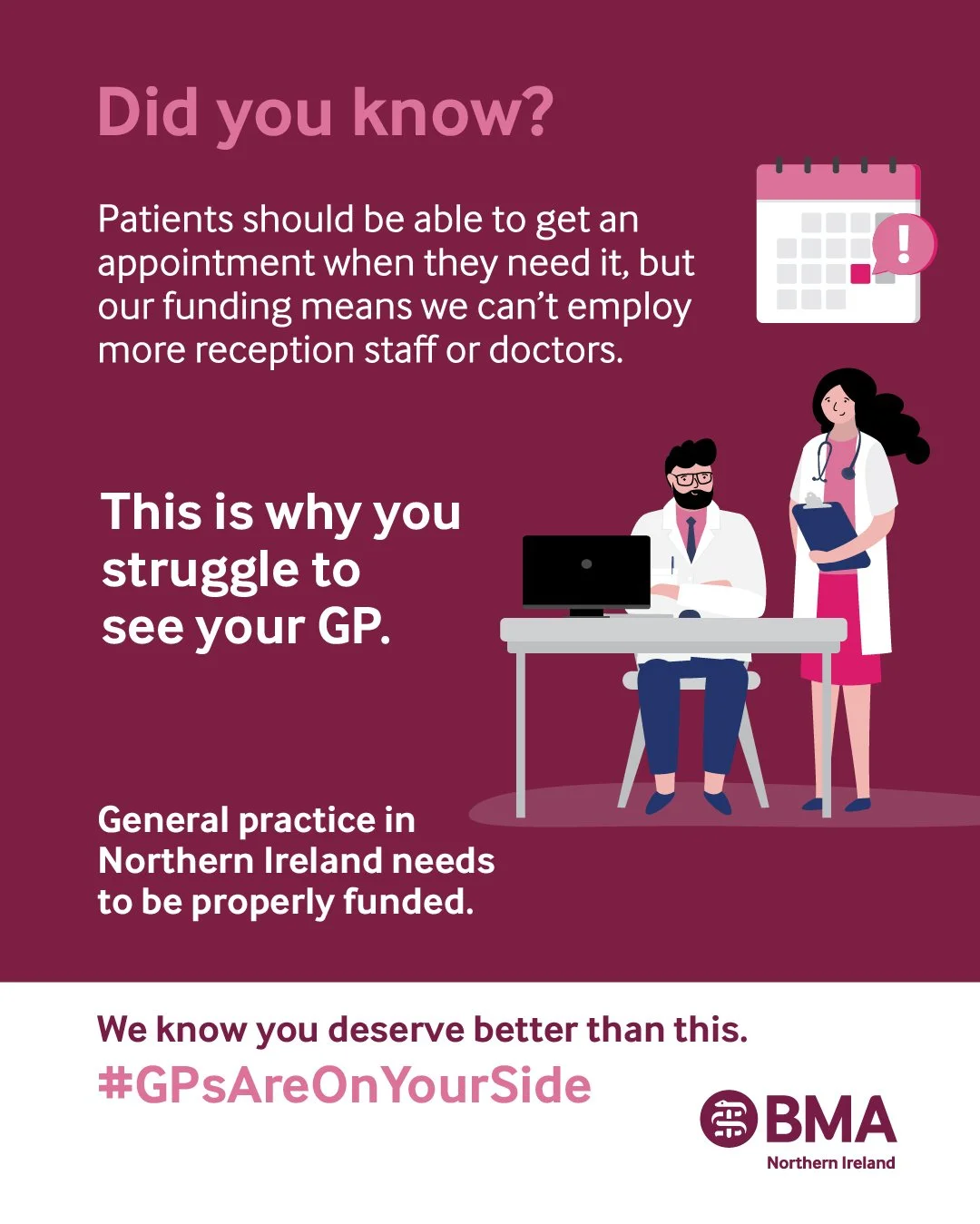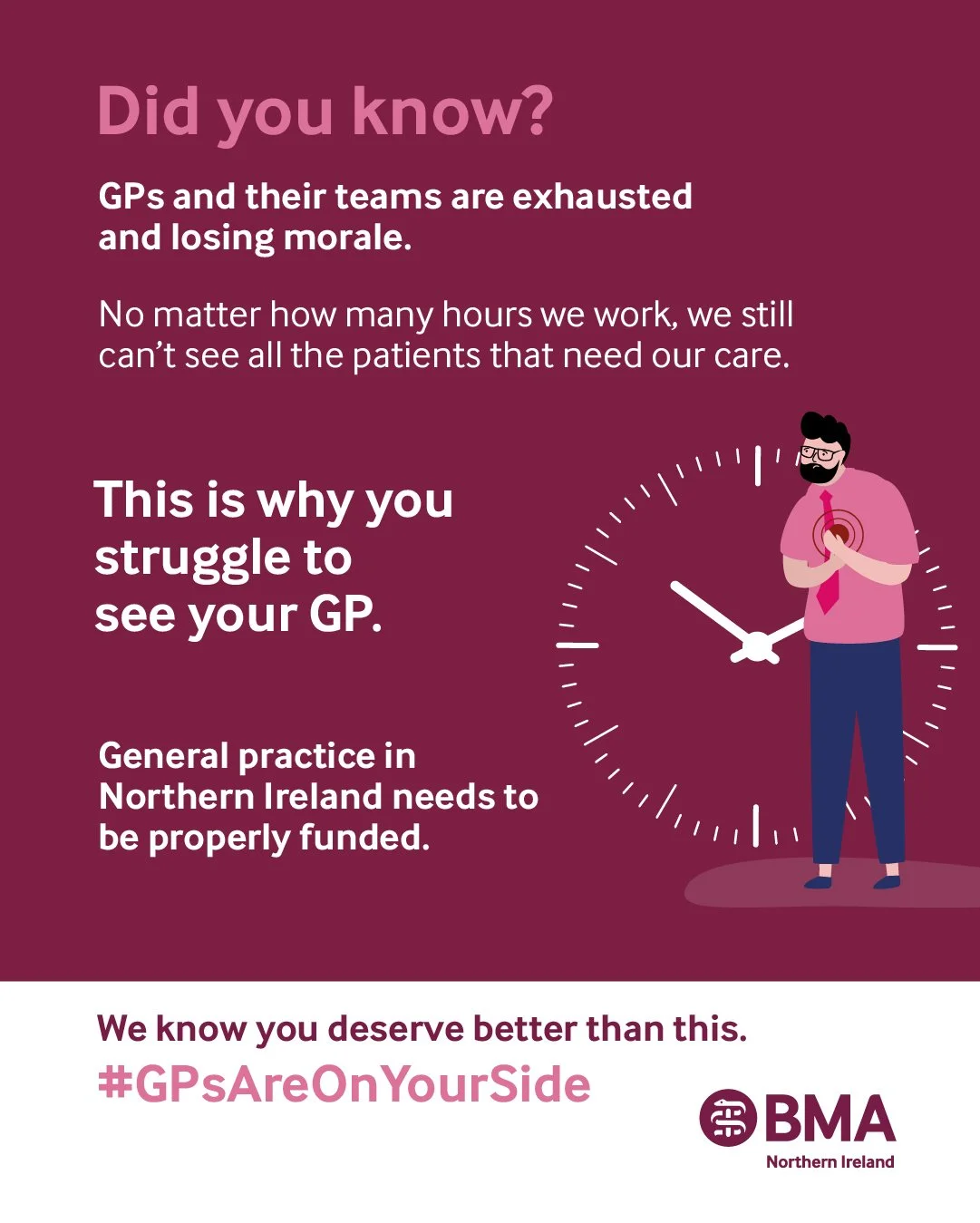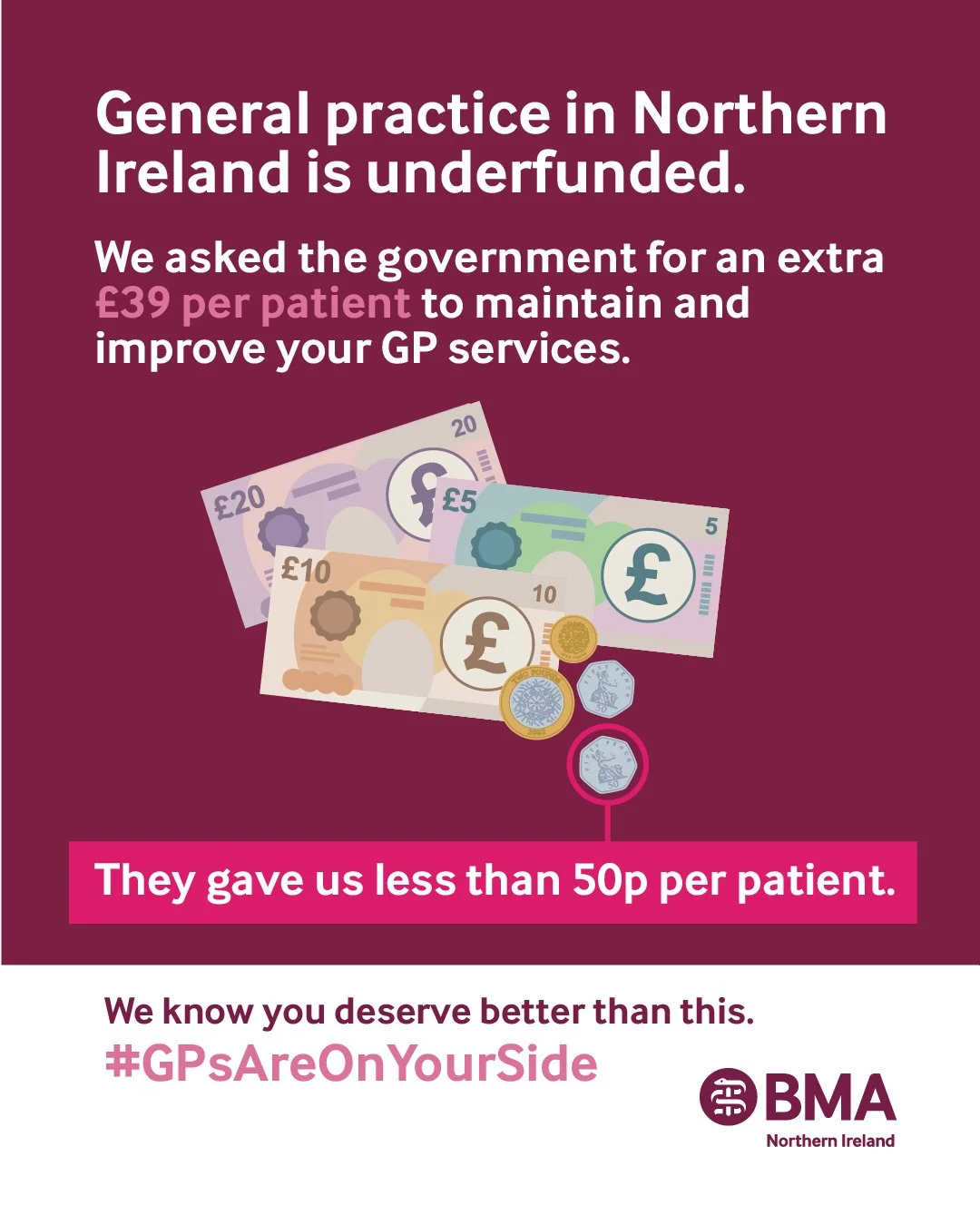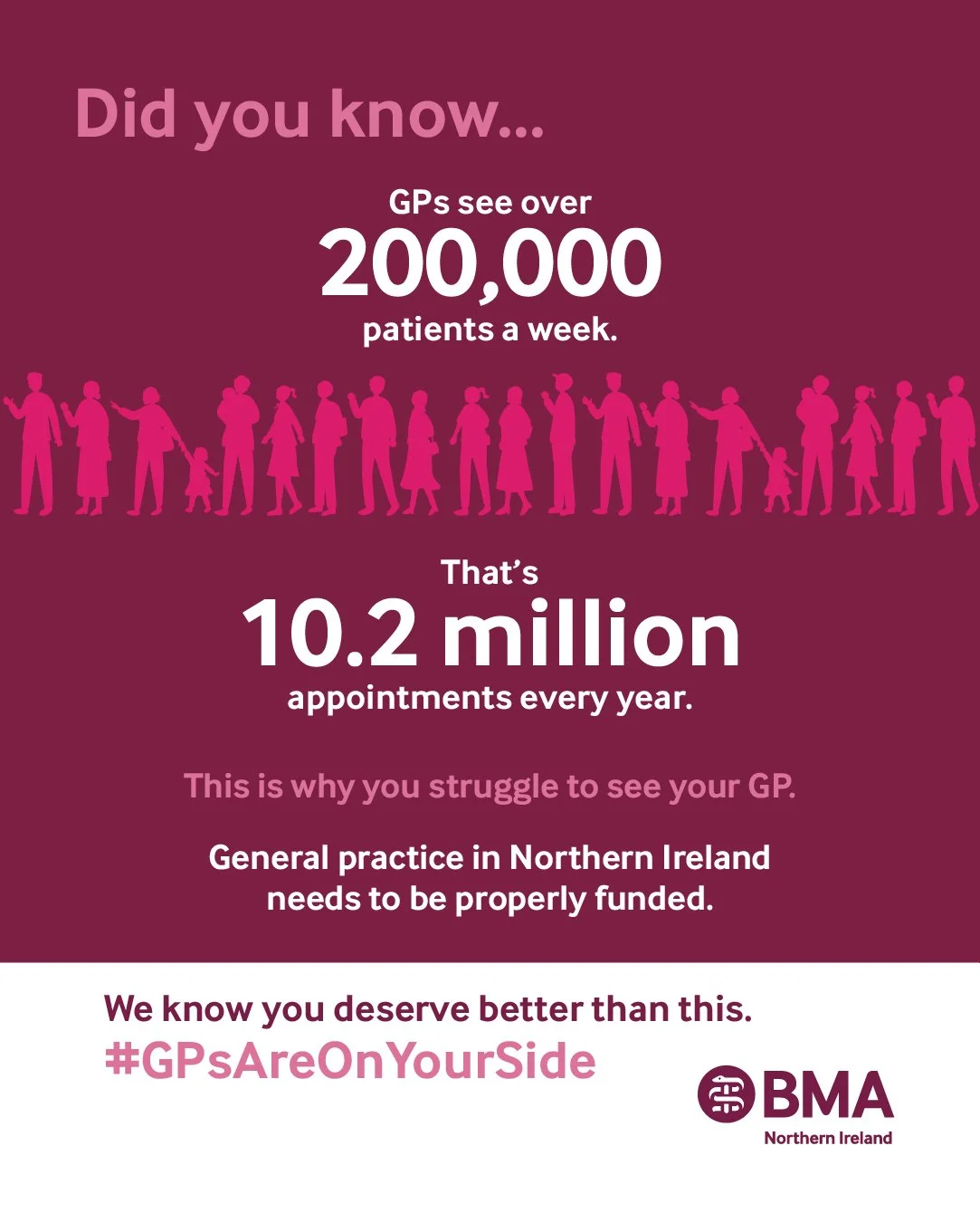Collective Action For GP Partners - Northern Ireland
General practice in Northern Ireland is facing unsustainable pressure. Following the imposition of a new GP contract without agreement, the BMA’s Northern Ireland General Practitioners Committee (NIGPC) has led a coordinated campaign of collective action. With the backing of over 98% of GP partners, practices are now implementing safe, contractually compliant measures to reduce unfunded workload and protect patient safety. This page provides guidance, updates, & resources to support you throughout the action. The NILMCs are working closely with NIGPC and the BMA to ensure all GPs are informed, supported, and represented.
Sign up to the LMC mailing list to receive timely updates, guidance and resources
Latest News
Latest News
Date: published 5th September 2025
New patient poster
Non Emergency Ambulances
BMA have published a new poster to help explain to patients why Practices are no longer ordering ambulances, This is available to download HERE
Date: published 22nd October 2025
CA Surveys
NIGPC are gathering feedback from GP practices to help inform further actions regarding GP Collective Action.
Your input is valuable and will shape our next steps. Please complete each survey when received and it should only take a few minutes.
Surveys will repeat in November and December.
Collective Action Options
Practices can choose from the following actions as part of NIGPC-led collective action. These are not mandatory but are contractually compliant and legally vetted.
-
Limit daily patient consultations per clinician to the UEMO recommended safe maximum of 25.
Consider 15-minute appointments.
Each contact will require appropriate care navigation, with practices ensuring that urgent care provision is protected and caution taken for vulnerable groups. If demand for urgent care exceeds safe levels, consider directing patients to appropriate alternative settings such as urgent care centres, Phone First, GP out-of-hours, Accident and Emergency, and the Northern Ireland Ambulance service.
Consider using one afternoon per week to ensure that your educational needs, clinical tasks which do not require direct interaction with a patient, and governance work, are all undertaken in-hours. During this afternoon, you will need to provide urgent cover for your practice patients.
Consider signposting to self-referral AHP services where appropriate.
How to take this action?
Utilise template communications from BMA, adjusting as needed for local circumstances, the following wording may be helpful to explain the situation:
"The practice is currently experiencing unmanageable demand for urgent care. Taking account of our patients’ and the practice team’s safety and the availability of other options for patient care we are not able to see any more patients today. We are sorry for this inconvenience, which is beyond our control. If you have an urgent medical problem that you believe cannot wait. then you should seek help from other NHS agencies including Phone First or through accident and emergency." -
Cease non-contractual activities that are voluntary and/or completely unfunded.
(e.g. ECGs, medications for hospital tests, complex dressings, PSA monitoring, urgent scripts for secondary care)Professional obligations may require appropriate notice, especially where services have been provided long-term without funding.
Activity falling under these actions include:
Undertaking ECGs where this is more appropriately delivered in secondary care
Preprocedural medications or medications used for hospital tests (as per HSS MD 26/2022)
Complex wound and ulcer dressings/post-op wound care where there is no enhanced service with the appropriate governance requirements in place
PSA / MGUS chronic monitoring
Bloods for secondary care, particularly those with clinical risk (e.g. PSA with unusual reference interval)
Urgent scripts for secondary care services such as Psych Home Treatment teams (unless funded to do so)
Non-emergency ambulance ordering e.g. for first outpatient attendance
New activity associated with waiting list initiative suggesting GP provision of pre-/post-op care
Fit Notes through Epic for patients under their care of Trust at outpatient or on discharge from acute care.
This is a non-exhaustive list intended to give an idea of what this action intends to incorporate. Local circumstances will need to be considered and action taken as appropriate.
-
GPs make clinical decisions on whether to make referrals for specialist secondary care, based on their best judgement and professional obligations. Using the Clinical Communication Gateway (CCG), GPs have distinct options - either to refer for a face-to-face appointment with an appropriate specialist or, for a limited number of specialties, request advice and guidance from a specialist on how a patient’s treatment can be locally managed.
In some instances, HSC Trusts unilaterally change a GP referral for a face-to-face appointment to a request for advice and guidance, effectively discharging the patient with advice on local management. GPs are often left to facilitate and communicate this to the patient, despite it conflicting with their clinical decision that referral for face-to-face secondary care is advisable.
Unless the guidance on local management is either specifically requested, or is otherwise timely and clinically helpful, GPs should write back to the HSC Trust, re-referring the patient and insisting on appropriate specialist provision. When writing back, the GP should insist that the Trust communicate directly with the patient, rather than via the GP.
How to take this action?
Template communication, via CCG or as appropriate: Insist on referrals for specialist appointments when clinically appropriate
Ensure patients are informed of actions being taken in their interests.
-
GPs currently complete large volumes of paperwork which is not required by their contracts but plugs gaps in the wider health and care system. Often this is unfunded and has no direct link to patient outcomes. Where this is the case, requests to complete paperwork may be redirected to the other appropriate agencies.
There is an assumption that in order to access other statutory services a letter or note from a GP is required. However, this is rarely the case and furthermore is it not resourced. Certain GP paperwork can be required to ensure patients can access other statutory services, however this is not resourced.
One significant example could be paperwork associated with patient registration - GPs and practice staff may cease taking actions to gather and verify documentary evidence to assess entitlement to NHS healthcare. This instead should be forwarded to the BSO for entitlement to be determined. Other high-volume examples may include un-resourced drafting of letters:
to support patient applications for social housing
to support educational provision in schools
to support applications to the Home Office
to support reports for benefits applications.
This is a non-exhaustive list intended to give an idea of what this action intends to incorporate. Local circumstances will need to be considered and action taken as appropriate.
How to take this action?
With regards to verification of patient documentation to ensure eligibility for NHS services, GPs can continue to see and treat patients whilst eligibility is determined, however, BSO will need to chase up what, if any, additional documentation a patient is required to provide to enable it to make a determination on eligibility. Current provision allows for capitation to be paid quarterly, until an entitlement to NHS care is rejected by the BSO
GPs, and their practices can determine individual approaches to the other types of paperwork they will cease to complete and how this will be communicated to patients and other agencies.
-
Switch off medicines optimisation software embedded by the SPPG. This software often produces pop-ups on the screen during patient consultations and when issuing acute and repeat medications.
How will we take this action?
Where this software is already in place, the medicines optimisation software can be switched off. As this software is introduced to other practices, they can opt not to utilise this software in the first instance.
Last updated: 21st August 2025, 13:17
Guidance & Resources
-
GUIDANCE - BMA Guidance on Collective Action
For full details on the collective action agreed by NIGPC, including legal advice, safe workload limits, & practical steps for implementation, visit the BMA’s official guidance.
-
GUIDANCE - BMA Safe Working
This guide from NIGPC (BMA Northern Ireland) outlines how GP practices can manage workload safely and legally under the GMS contract. It provides clear recommendations on appointment limits, patient access, secondary care work transfer, and list management. Practices can use this to assess their capacity and take protective steps when demand exceeds safe limits.
-
POSTERS - Patient Facing
BMA have produced posters and social media graphics for practices to use for highlighting the pressures on general practice & the reasons for collective action.
Template Letters
-
General Transfer of Work Response
This template is for responding to inappropriate requests to transfer work from secondary care.
-
Complex Wound Dressing - Template Letter
Template from LMCs for practice use when serving notice on Complex Wound Dressings
-
Secondary Care Prescribing Request Response
Use this template when declining a request from secondary care to prescribe a medication that should remain the responsibility of a specialist.
-
Requests for Post Operative Checks
Use this template to respond to requests from secondary care asking GPs to perform post-operative reviews. The letter explains why this falls outside the GMS contract and should be handled by the responsible surgical team.
-
Response to requests to follow up investigations performed in other settings
Use this template to respond to secondary care requests asking GPs to follow up tests they did not order. It clearly states that responsibility lies with the requesting clinician, in line with GMC guidance and the Working Better Together principles.
-
Insist on referrals for specialist appointments when clinically appropriate
Use this template when a Trust downgrades or discharges a referral made in good clinical faith. It supports GPs in re-referring the patient and insists that communication about rejected referrals be made directly to the patient by the Trust. This reinforces safe clinical decision-making and reduces unnecessary GP admin and re-referral workload
-
General Transfer of work response: complex wound dressings
This template is for responding to inappropriate requests for complex wound dressings from secondary care.
NIGPC Official Correspondence
-
Letter to PHA Chief Executive
-
Letter to HSC BSO Chief Executive
-
Letter to NIAS Chief Executive
-
Letter to NHSCT Medical Director
-
Letter to NHSCT Chief Executive
-
Letter to SHSCT Medical Director
-
Letter to WHSCT Medical Director
-
Letter to WHSCT Chief Executive
-
Letter to BHSCT Medical Director
-
Letter to BHSCT Chief Executive
-
Letter to SEHSCT Medical Director
NILMC Correspondence
-
ELMC Letter to BT SET
